Streamlining the contract awarding process ensures that SayPro’s operations run smoothly and that the company is able to make prompt decisions regarding procurement and project execution
Key Initiatives and Improvements
- Centralized Contract Evaluation Framework
SayPro implemented a more centralized framework for contract evaluation, which involved the standardization of bid assessment criteria and the consolidation of procurement data. This approach reduced the time taken to evaluate proposals and ensured greater consistency in decision-making. The result was a more transparent and accountable process that aligns with SayPro’s governance standards. - Digitalization of the Procurement Cycle
The company introduced digital tools to manage tender documentation, automate routine workflows, and enable real-time tracking of contract stages. These technologies facilitated faster response times from vendors and allowed internal stakeholders to collaborate more efficiently, significantly reducing administrative delays. - Cross-Functional Review Panels
SayPro formed cross-functional review panels composed of procurement, legal, finance, and project management experts to vet contracts. This multidisciplinary approach enabled quicker resolution of potential contract risks and ensured that awarded contracts are viable from both operational and financial perspectives. - Streamlined Approval Protocols
The approval chain for contracts was redesigned to eliminate redundant sign-off stages while maintaining necessary compliance checkpoints. By assigning contract thresholds to designated authorities, SayPro minimized bottlenecks and empowered managers to act promptly on time-sensitive procurement matters.
Operational Impact
- Faster Procurement Decisions: The average time taken to award a contract in January was reduced by 35% compared to the previous quarter, enabling quicker onboarding of service providers and suppliers.
- Improved Project Kick-offs: With contracts being finalized more efficiently, project execution timelines experienced a significant boost. Several projects initiated under the January procurement cycle began ahead of schedule.
- Cost Savings: Through improved competitive bidding and faster turnaround, SayPro reported a reduction in procurement overheads, contributing positively to the company’s financial performance.
Forward Strategy
Looking ahead, SayPro plans to further integrate analytics into its procurement strategy to anticipate market trends and vendor performance. The company is also exploring the potential of AI-based contract lifecycle management systems to gain deeper insights into supplier engagement and contractual compliance.
